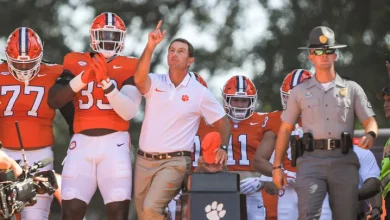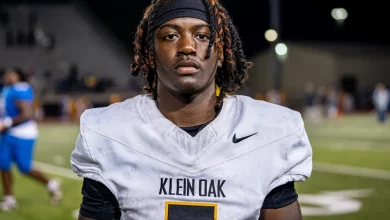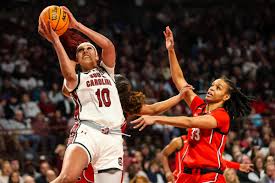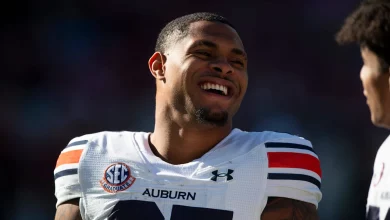Why Todd Hartley’s TE room is the best in college football is demonstrated by what he searches the country for.
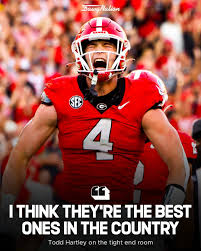
In the modern game of college football, the tight end position has undergone a dramatic transformation. Once considered a supplementary piece to the offense, the tight end now plays an integral role, bridging the gap between the offensive line and wide receivers. They are expected to excel not only in the passing game but also as formidable blockers, contributing to both the running and passing attacks. Few programs have recognized the evolving importance of the tight end as well as the University of Georgia, and none have better cultivated elite tight end talent than Todd Hartley, the Bulldogs’ tight ends coach.
Under Hartley’s guidance, Georgia’s tight end room has become the most feared in college football. From utilizing tight ends as dual threats in the passing game to developing physical blockers who control the line of scrimmage, Hartley has established a culture of excellence at the position. But it’s not just about the current success; Hartley’s commitment to finding and developing the best talent in the country is at the core of why his tight ends have become so dominant. What Hartley searches for in recruits, the specific traits he values, and how he molds them into NFL-caliber players is what has made his tight end room a standout unit in college football.
A Legacy of Excellence Under Todd Hartley
Before delving into the specifics of what Hartley looks for in recruits, it’s important to recognize the context of his success. Hartley joined the Georgia football staff in 2018, and since then, the Bulldogs’ tight end room has been among the most productive in the nation. Under Hartley’s tutelage, Georgia has developed a reputation for producing tight ends who are not only versatile and productive in the passing game but also excel in their blocking duties, making them invaluable assets in both offensive schemes.
Since Hartley’s arrival, Georgia has seen significant improvement in the development of its tight ends. Whether it’s players like Brock Bowers, Darnell Washington, or tight ends yet to emerge, Hartley’s coaching has been a key factor in their success. It’s not just about recruiting high-profile players; it’s about transforming them into well-rounded, elite-level talents capable of contributing to every aspect of an offense.
In fact, under Hartley’s watch, Georgia has boasted some of the most talented and productive tight ends in college football. Brock Bowers, in particular, has been a revelation for the Bulldogs, becoming one of the most feared and dynamic tight ends in the country, earning All-American honors and being a potential future first-round pick in the NFL Draft. His success is a testament to Hartley’s ability to identify and develop elite talent.
What Todd Hartley Searches for in Tight End Recruits
To understand why Hartley’s tight end room is so successful, it’s crucial to first look at what he values in his recruits. Hartley is known for being meticulous in his scouting and recruiting process. He searches for specific traits that align with Georgia’s offensive philosophy, and his keen eye for talent has allowed him to assemble one of the deepest and most talented tight end rooms in the country.
1. Versatility
The modern tight end is expected to do it all: block, run routes, catch passes, and create mismatches against defenses. Versatility is the most critical trait Hartley looks for in a recruit. A tight end must be able to excel in multiple areas of the game, providing his team with a weapon who can impact the offense in several ways.
Georgia’s tight ends have become known for their ability to line up all over the field — whether it’s in-line on the offensive line, split out as a receiver, or even in the backfield as an H-back. Hartley looks for recruits who are not only physical enough to block but also have the athleticism and hands to be dangerous in the passing game. Brock Bowers is the perfect example of this, with his ability to make plays in space and his deep threat potential, combined with his solid blocking technique.
The ability to create mismatches is another reason why versatility is so critical. A tight end who can line up in different spots and create problems for defensive coordinators is invaluable. Hartley specifically targets tight ends who can be moved around the field to create favorable matchups against opposing defenses.
2. Athleticism and Speed
While tight ends of the past were typically seen as big, lumbering players who spent most of their time blocking, the modern tight end has become a more athletic and dynamic player. Hartley looks for athletes who can run routes like wide receivers, while still having the physicality to excel as blockers when needed.
A key part of this is speed. Hartley places a premium on recruiting tight ends who can stretch the field vertically. The ability to run precise routes, get off the line of scrimmage quickly, and gain separation from defenders is critical to the success of Georgia’s offense. Tight ends like Bowers, who possess both elite speed and agility, are able to exploit mismatches against linebackers and safeties, opening up opportunities for big plays.
Athleticism also plays a role in a tight end’s blocking ability. A more agile player is able to get to the second level of defenders and seal off linebackers or defensive backs more effectively. This level of athleticism is essential for Georgia’s offense, which often incorporates tight ends in both the run game and pass protection schemes.
3. Physicality and Blocking Ability
While athleticism is critical, the ability to block is just as important for Todd Hartley’s tight ends. Georgia’s offensive scheme often requires tight ends to function as in-line blockers, creating running lanes for the running backs and providing protection for the quarterback. Hartley understands that a tight end who can block at a high level is a valuable asset to the offense.
When recruiting tight ends, Hartley looks for players who are willing to engage defenders in the trenches and dominate at the point of attack. A tight end must be able to hold his own against defensive ends and outside linebackers, and Hartley places a strong emphasis on this aspect of a player’s skill set. Darnell Washington, a towering 6’7” target, was a perfect example of a tight end who was as dominant as a blocker as he was as a receiver.
Physicality in the run game is also a key component of Georgia’s success. Hartley’s tight ends are often tasked with executing key blocks on running plays, particularly on stretch runs or power plays where the tight end has to clear the edge or seal off defenders at the second level. The ability to do this effectively requires a combination of size, strength, and technique.
4. High Football IQ
Another essential trait that Hartley looks for in his recruits is a high football IQ. Tight ends are required to make quick decisions on the fly, whether it’s adjusting their routes based on coverage or recognizing defensive shifts. A tight end with a high football IQ can diagnose these situations and make split-second adjustments, making them a more effective weapon for the offense.
Hartley looks for players who understand the game on a deep level, who can learn complex offensive schemes, and who can read and react to defenses quickly. Whether it’s understanding where the open spaces are in a zone defense or reading the defensive linemen’s stance to adjust their blocking techniques, a high football IQ allows tight ends to excel in all aspects of the game.
Brock Bowers’ success can, in part, be attributed to his ability to process information quickly and adjust his route running or blocking assignments based on what the defense is showing him. This ability to read and react has made him one of the most dangerous tight ends in college football.
Developing Talent for the Next Level
What makes Todd Hartley’s tight end room the best in college football isn’t just the talent he brings in — it’s the way he develops that talent. Hartley’s coaching expertise is evident in how he shapes his players into well-rounded, polished athletes who are capable of excelling at the highest levels of football.
1. Teaching Fundamentals
Hartley is known for his emphasis on the fundamentals of tight end play. Whether it’s running crisp routes, improving blocking techniques, or learning how to read defenses, Hartley ensures that his tight ends are fully prepared for the demands of college football. His attention to detail has led to impressive development for players like Bowers, who came to Georgia as a highly touted recruit and blossomed into one of the top tight ends in the country under Hartley’s tutelage.
2. NFL Preparation
One of the reasons Hartley’s tight ends are so successful is that they are often well-prepared for the next step in their careers. Hartley’s focus on developing tight ends who are versatile, athletic, and physically dominant makes them highly attractive to NFL scouts. His ability to mold players into complete tight ends has led to Georgia tight ends being drafted in the NFL, with several players continuing to excel at the professional level.



